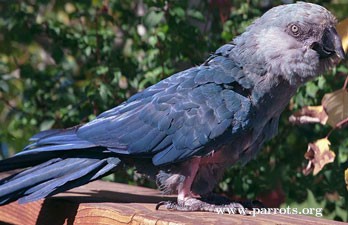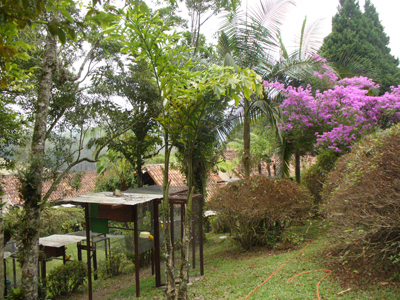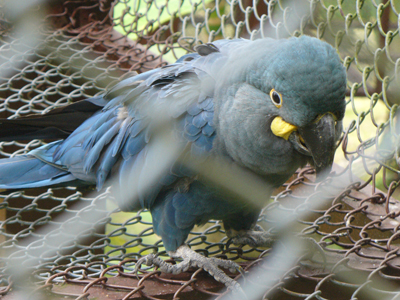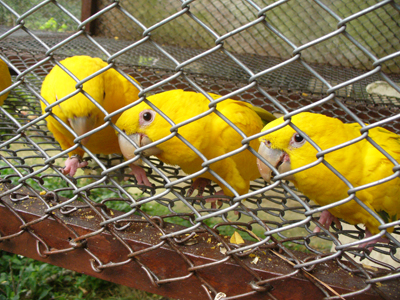Part I - The Lymington Foundation
"Recalculating," the voice on my GPS drones patiently after I take yet another wrong turn along the labyrinthine streets of Sao Paulo. Motorbikers buzz by me on all sides as I wrangle my way through traffic, passing piles of decrepit houses, giant tenements, and graffiti in Portuguese scrawled on every possible surface. When I reach a high point on the road, a vast gray forest of high-rises emerges on the horizon. It is a seemingly endless array--dwarfing the skyline of New York or Los Angeles--which houses this city of nearly twenty million people. I imagine that from space Sao Paulo appears like a giant ink blot splattered in the middle of a green and blue earth. Still, it is impossible to feel holier-than the Brazilians, the majority of whom lead lives of far less environmental impact than the poorest Americans.
It takes all my concentration to thread my way through the narrow streets choked with traffic. After what seems like hours, the buildings thin. Space appears between cars and the odd grassy space emerges between houses. The tenements give way to soft rolling hills, and before long I start to pass patches of tropical trees I do not recognize. Eventually all becomes green and gold, interrupted only by the occasional abandoned house and behemoth truck stop that marks time along Brazilian highways.
I am on my way to visit a very special bird: Presley, a Spix's Macaw, one of only five Spix's currently residing in their native Brazil, and one of fewer than one hundred of this species surviving worldwide. Presley currently resides with Bill and Linda Wittkoff at my destination, the Lymington Foundation, in a rare patch of surviving rainforest a few hours outside São Paolo.

Presley, Spix's Macaw
© 2004 Mickey Muck | World Parrot Trust
My instructions are to turn onto an unmarked dirt road that leads directly off of the highway. The road is a dark red, the color of the earth here in Brazil, which matches descriptions I have heard of the fertile soil in Africa. My second-rate rental car is just barely up to the task of negotiating the rocks and potholes and I wonder if I'll make it out again alive. Still, it is nice to leave the asphalt behind, and overhanging trees shade the road. Homes and estates lie hidden among the green, and there are few other cars though I do pass a bicycle or two. I pass a small shop with people lounging peacefully outside in the languorous air.
The Lymington Foundation, lies at the far end of this road. I haven't seen any other human creatures for awhile now, until the kind groundskeeper and less kind-looking guard dog greet me at the gate and point my way towards the main house. My rental clatters along even more primitive road, into a lush tropical valley, past an olive-green lake with some purple-flowering tree mirrored in its surface. The surrounding hills are thickly covered with palms, hanging vines and fruiting trees. The sound of my struggling engine overpowers their sound, but I see them: birds, everywhere.

Lymington Aviaries
© 2013 Emily Robinson
I urge my reluctant vehicle up a precipitous incline and past a goose pond, finally arriving at the dwelling of Bill and Linda Wittkoff, keepers and proprietors of the Lymington Foundation. Lymington sits on 150 acres of Atlantic rainforest on a parcel of land acquired by the Wittkoffs soon after they first moved to Brazil in their early twenties. They bought their first parrots in a pet store--two Amazons, who still reside with them. Later on they were given a pair of Blue and Gold Macaws, who loved each other enough to produce nineteen chicks. This experience eventually led them to establish an invaluable breeding program for endangered parrots which the Wittkoffs now run at Lymington.
If I had to characterize the mission of the Wittkoffs in a few short words, I would say, it is to spread life. When they first bought this piece of land, it was stripped and barren. In a true-to-life terraforming venture, they reseeded it with native plants and trees--no one to look at it now would imagine it ever to have been any other way. They keep a garden that supplements not only their own nutritive needs, but also those of the many parrots, sheep, and geese. They keep a handful of cats, dogs, and turtles. Hundreds of orchid starts line the wall of the veranda of the guest house where I am to stay and adorn tree branches and stumps where Linda has affixed them. Throngs of exotic Brazilian birds come to sip off of the bird feeders, often helping themselves to the surplus in the aviaries as well. Unnumbered airborne bromeliads have attached themselves to trees, branches, even gutters. While we are eating a lunch of Brazilian root vegetables, devilled eggs, and jam made from a mysterious purple fruit grown here on the property, the groundskeeper arrives with a newly hatched gosling cupped in his hands to ask for Linda's advice. Brightly colored tropical flowers surround their house and grow wild in the rainforest. Jewel-toned hummingbirds war over a favorite yellow-flowering tree outside my guest villa. It is like being in another world, another time.
The Wittkoffs' house is small, unassuming, and built with their own hands, as are the strings of aviaries which line the adjoining hillside. Over the years, Linda's reputation as a successful breeder has grown, and now the Wittkoffs work on breeding Hyacinth Macaws, Blue & Golds, Harpy Eagles, and spunky Golden Conures who race along the side of the aviary as I pass, daring me to threaten their cozy little sanctuary. Linda has written treatises on the breeding of Hyacinths and Golden Conures, over eighty of which she has raised. Lymington is also home to a lone Lear's Macaw (a refugee from the Sao Paulo Zoo who is currently sharing an aviary with a Blue & Gold), and of course Presley. Presley's miraculous discovery in Colorado thirteen years ago inspired the story for the Twentieth Century Fox film, "Rio." It was in the course of researching an article about Presley that I became acquainted with Bill and Linda, who have graciously opened their home to me now. (For more on Presley's history see my article, "Revisiting Rio Star Presley: Is There Hope for the Spix's Macaw?")

Young Hyacinth Macaws
© 2013 Emily Robinson

Lear's Macaw
© 2013 Emily Robinson
Besides growing much of their own food and building and renovating their own homes, the Wittkoffs lead an admirably low-impact life. Their cars and appliances have survived decades due to careful tending and maintenance. They do not consume much in terms of food, possessions, or technology. They do not own a dishwasher, and make coffee using the "countertop" method of pouring hot water over a filter directly into the mug (it was excellent).
Bill and Linda are wholly devoted to the birds in their care. Besides the aviaries they work on several other projects, including training birds intended for future use as therapeutic companions, and an exciting project for releasing Vinaceous Amazon parrots directly into their own patch of rainforest (this project is managed in tandem with the World Parrot Trust and is described in detail in the November 2012 edition of Psittascene). They also care for a handful of rescue birds. Mira is a fluffy red Scarlet Macaw who shuffles around on permanently crippled toes; she suffered seventeen fractures in her legs after smugglers stuffed her into a PVC pipe and transported her 2000 kilometers while still inside it. Presley's current companion is Killer, a Golden Conure who was anonymously left at the Sao Paulo Zoo, near death due to a poor diet and close confinement in a tiny cage. Killer wins my heart completely, with her rumpled feathers and hunchback style of lurching around the cage on her unsteady feet. Despite her handicap and past hardships she has a cheery attitude and chirps endearingly at me. She and Presley seem to be very comfortable together, even though being genetically disparate. Above all, Linda respects the birds' need to choose their own mates. I believe much of her success in breeding is due to her instinctual respect for the birds as beings no different from humans, with a right to as high a quality of life as we can provide in captivity, and also for the ancient reproductive force perfected by nature over the millenia--love.

Golden Conures
© 2013 Emily Robinson
Later in the afternoon Linda takes me to the guest house--my "rainforest villa," as I like to think of it. Bill and Linda lovingly rehabilitated this Mediterranean-style house. It has ceramic floors and parrot-themed art lines the walls and corridors. The wooden shutters on the doors and windows stand open, without screens or locks; there is literally no way to shut nature out. The feeling is at once unnerving, at once thrilling: I imagine visits from giant bugs, predatory animals (a jaguar once made a guest appearance at Lymington), even a trespassing human--but of course none of this comes to pass. I begin to wonder what the true cost may be of isolating ourselves from the threats but also the joys of nature. An image of my African Grey, Oscar, surfaces in my meditations; Oscar when ready for a nap will climb into his cage and bang the door shut behind him.
Sitting on the orchid-lined veranda I watch the brilliant hummingbirds feeding off of the bird-of-paradise flowers and listen to the vast array of sounds from the surrounding valley--the songs of the forest birds, whirring of the warring hummingbirds, and the screeches from the macaws up the hill. Very few human sounds penetrate this far into the wilderness, and I realize that this is what the world must have sounded like for millions of years before humans drowned out the concert of nature with their machinery and engines. At night I lie in the bed and listen to a concert of a different kind--literally millions of frogs of countless different species chirping, croaking and trilling the hours away until after midnight, when they mysteriously fade away into silence. The miracle begins all over again when the sun approaches the subtropical horizon and the dawn chorus of the Brazilian rainforest bursts gloriously forth.
Linda's day starts early. Although the Wittkoffs have help tending the aviaries and rescue birds, the work of feeding, cleaning and caring for the parrots is never-ending. Spring and nesting season has just begun and many pairs are busy chewing away at their nest holes and eagerly seizing the opportunity to defend their territory from passersby like me. Once the birds near the house are appeased I accompany Linda to the release aviaries for the Vinaceous Amazons where we set out plastic dog bowls of supplementary fruit, native berries and slices of corn cob prepared the night before. Vinaceous Amazons are named for their wine-colored belly and have feathers on the nape of their necks which rise like a mane, giving them a fierce saurian look. I shudder as I watch Linda fearlessly navigate a narrow board inside the aviaries to refill coconut shells used as water bowls for the yet-to-be-released individuals. The free birds flock noisily to the dog bowls and gnaw on the berries. We check the nest boxes and count the birds, accounting for each individual. I imagine that the free Amazons must feel much like I do--both terrified and thrilled by their immersion in nature. The caged Amazons are safe, well cared for, and have little to fear--but as Linda says, no amount of enrichment can compare to a life of free flight.

Vinaceous Amazons
© 2013 Emily Robinson
We stop at the garden to collect greens for the geese which await us at our next stop. From the grassy banks of the pond Linda proudly points out her Canada Geese, ironically the one bird here that fails to impress me, being ubiquitous denizens of parks and golf courses in my Northwest home. After witnessing the huge amount of work that goes into running Lymington on a daily basis, I resolve never again to complain about cleaning our two parrot cages at home.
The Lymington Foundation is involved in many other projects besides the ones on its grounds. Bill is in charge of the technological and business side of the operation. The Wittkoffs assisted Al-Wabra in the acquisition and management of land in North Bahia state intended for a future Spix's Macaw reintroduction effort. They are also involved in a campaign to reimburse corn farmers whose crops are regularly damaged by foraging Lear's Macaws, and many other projects besides.
In the afternoon while Bill and Linda are taking a well-deserved siesta I sit on the porch and marvel as bird after spectacular bird comes to visit without my having to move a muscle. Some are so amazingly colored I cannot believe they are real even though they are just feet away. There are no sounds other than the occasional parrot squawk, the breeze in the surrounding forest, and the distant honking of geese from the pond at the foot of the hill.
This far removed from human population, certain things that usually occupy most of my mental time are shed like an old skin: what time it is, what day it is, my appearance, my to-do list for the day. The constant drive to acquire things and meet expectations evaporates and is replaced by a sense of wholeness and contentment. I start to wonder whether our never-ceasing drive to get more is a consequence of our divorce from nature and love--whether the dissatisfaction so prevalent in the civilized world can ever be fulfilled by cold, inanimate things that can never love back. And I experience a dawning sense of irony that this thirst for things causes us to inadvertently destroy the very thing we most crave, the one thing that will truly answer this sense of loss--unity with nature.
Instead of my usual daily worries I spend time with the parrots, sitting next to the aviaries and communing with the curious, bright-eyed Golden Conures who clamber over to examine me. It is heartwrenching to realize that these adorable creatures are desperately threatened in their native habitat by poaching and deforestation. Attempts to defend them are facing stubborn obstacles of human ignorance, poverty and greed--even life-threatening situations for biologists who, if the species is to survive, must learn more about the birds and their habitat before it disappears completely.
In the evening, the rescue birds are put to bed for the night, and Bill mixes a cocktail for me featuring their homegrown lemons and some strange liquor I've never encountered. I get acquainted with Rudolph, a Timneh African Grey who flies around the room and perches on Bill's head. Rudolph wins my heart immediately as I am missing my own "TAG" Oscar at home. Linda describes with tears in her eyes the horrors she has seen of birds kept in captivity here in Brazil, which is why the Wittkoffs refuse to raise birds as pets and will breed exclusively for conservation efforts. She tells me about the very first Vinaceous Amazon she released, and how she laid awake all night, worrying about the rain and the danger and whether the bird would be found in the morning.
I leaf through a scrapbook Linda has kept about everything Presley: news clippings about the last Spix's disappearing from the wild, letters detailing Presley's poaching and his discovery in America, and pictures of the eggs he laid with the one mate he has ever known--a female Spix's by the name of Flor--which sadly proved to be infertile. We watch a documentary about the current Spix's populations in Germany, Spain and the Middle East which is filled with nightmarish images of the birds being tranquilized, poked, prodded, operated on . . . I remind myself that this is all necessary, but it is still horrifying to watch. The real tragedy of course is that we have come to this point--that Frankenstein-type intervention is our only recourse if we are to save the species from extinction.
In the afternoon of my second day at Lymington I am given the most precious gift of all; an hour or more of time alone with Presley. I sit next to the cage he shares with Killer on a porch overlooking the other aviaries and the fertile valley below. I find myself humbled and awed in his presence. Seeing a Spix's Macaw in person for the first time, I can understand better why they were poached to near-extinction. They are stunningly beautiful; smaller than I expected, but with sky-blue feathers that have no match in nature. It is hard to fully convey the ancient look of wisdom and sadness in Presley's eyes. Even if I had not been familiar with his tragic life story, I would have read it in those eyes.
Presley lived isolated from his species for most of his life; snatched from the Brazilian caatinga as a nestling by poachers, exported to Britain and thence to the U.S., losing his sibling somewhere along the way. He lived for over twenty-five years in America with an Amazon for a companion, and since his discovery thirteen years ago has spent only a few months with one of his own species (the failed mating attempt with Flor). Presley's spirit seems to me at this moment to be outside of time, seeing all and knowing all. It is as if, on some level, he is aware that he is one of the last of his kind, that he accepts their fate as an inevitable consequence of the greater workings of the universe. Is it anthropomorphism to read all this in Presley's face, I wonder? Perhaps, but those of us who are close to parrots know how human they can be--perhaps more than human. After all, it was humans who drove the Spix's into near extinction, scattering the tiny remaining population to the four corners of the earth, and splintering the natural order which once allowed them to choose their own mates, or even to live with others of their own species. It was humans who isolated Presley from his own kind for most of the life he will have. Ironically, now it is only humans who can save them. The creative forces perfected by nature over millions of years are no longer powerful enough to undo the damage we have done, and it may already be too late. Untold amounts of money and expertise are being poured into the cause, but in the end, all the king's horses and all the king's (Sheik's?) men may not be able to save this beautiful species from perishing from this earth.
Still, Presley himself appears contented and in good spirits, blinking at me sweetly, fluffing up his cheeks, bobbing his head and giving me the occasional affectionate chirp. He reminds me so much of our own companion parrots, gnawing on his nest box, drawing arcs on the cage floor with his beak. I am comforted to know that at the very least he has a companion he enjoys and a caretaker like Linda to watch over him. Killer limps over to chat and also is clearly cheerful. These two birds represent species at two stations along the road to extinction. For the Spix's there is no guarantee of success--many of the factors necessary to rescue them are simply beyond human capabilities. But for the Golden Conures, Lear's Macaws, Hyacinths and so many other species, action taken now to preserve their habitats, their numbers and thus crucial genetic diversity can prevent them from reaching the near-hospice state of the Spix's. The most important thing is not to wait until the numbers dwindle beyond the point of no return.
The more first-hand information I glean about the challenges the Spix's Macaws face--both biological and human--the more discouraged I feel . . . but also the more respect and awe I have for people like the Wittkoffs who, despite the unrelenting odds, tirelessly devote their entire lives to mitigating the damage other humans have done. The spirit of Lymington is almost prehistoric: committed to restoring the world nature created, a greater perspective, a wholeness, an openness inspired by life and love. As the gates close behind me and I creep along the rocky red road towards the highway I experience an unexpected, wrenching sense of loss, as if something in my primordial soul were ripped. It is time to retreat into the barred cage of civilization, and slam the door.
What you can do: Support organizations like the World Parrot Trust who identify, study and work to save the species in highest need of protection. General donations (i.e. without a specific target) are the most useful as these organizations can then distribute it to the projects they deem to be the most worthy and with the highest impact. They also track the funds to ensure they are being used wisely and that the recipients are accountable.
--
In Part II of "Brazil: Land of the Spix's" I will describe my visit to NEST on the Estancia Andrea, which currently cares for the four other Brazilian Spix's Macaws, and is intended as Presley's future home.
































